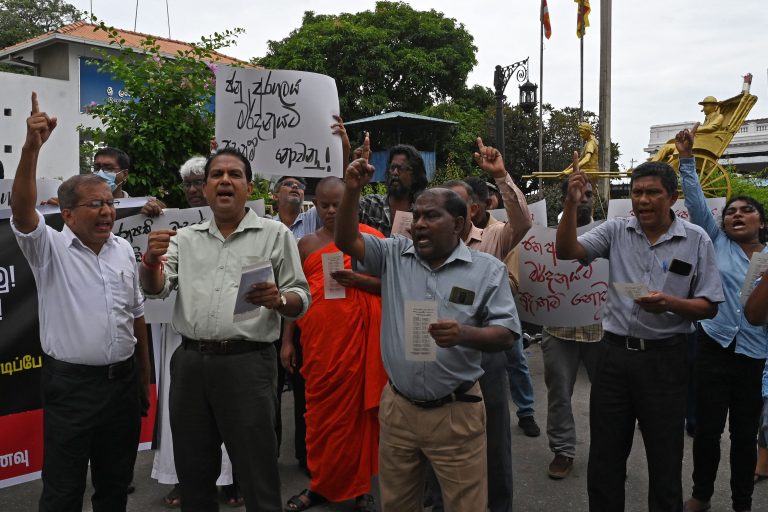According to a Sri Lankan Parliament spokesperson, on Sunday, July 10, Sri Lankan president Gotabaya Rajapaksa said he intends to resign within the next few days, as massive protests rock the capital of Colombo amidst a grueling economic crisis.
The government is expected to perform a transition of power as violence spreads throughout the capital of Colombo, which has resulted in several people being injured.
Power transfer amidst protests
According to a statement by speaker Mahina Yapa Abeywardena, parliamentary leaders have come forward calling on Rajapaksa to resign, to which he has agreed. He will continue to be in office until Wednesday, July 13, in order to allow for a “smooth transfer of power,” ABC reported.
Abeywardena has called for no “further disturbances” in Sri Lanka, pleading for citizens to allow the transition to take place without trouble.
“There is no need for further disturbances in the country and I urge everyone for the sake of the country to maintain peace to enable a smooth transition,” he said.
Success
You are now signed up for our newsletter
Success
Check your email to complete sign up
The political turnover comes as thousands of protestors surged through government locations throughout Colombo. Dissenters converged on the capital on Saturday following the lifting of a curfew that was considered illegal by lawyers and the opposition.
The president’s office was broken into, despite security trying to stop the protestors. Around 34 people were injured, including two police officers. According to an anonymous official at the Colombo National Hospital, two people were left critically injured by the chaos, ABC reported.
At least six workers at Sirasa Television were reported to be injured after the police allegedly beat them while they covered the protests at the prime minister’s home.
People have been recorded breaking into Rajapaksa’s residence, eager to see the president and Prime Minister Ranil Wickremesinghe ousted. It is unknown if Rajapaksa himself was present during the protests.
The prime minister’s private residence was also besieged, and lit on fire by protestors, Wickremesinghe’s office said. Wickremesinghe’s whereabouts during the incident are unknown.
Wickremesinghe has announced his resignation, but will continue to act until a new government is formed.
“Today in this country we have a fuel crisis, a food shortage, we have the lead of the World Food Program coming here and we have several matters to discuss with the [International Monetary Fund],” he said. “Therefore, if this government leaves there should be another government.”
The Sri Lanka Medical Council has warned that hospitals were low on resources, and are unable to tend to casualties of the violence.
Religious leaders said that Rajapaksa, who claimed that he was voted in by Sinhala Buddhists, lost his mandate, and Ven. Omalpe Sobitha, a Buddhist leader, called for Parliament to immediately seek an interim president.
Meanwhile, opposition parties are in talks concerning what the new government will look like. Rauff Hakeem, a lawmaker for the opposition, said that they have reached “a consensus” for the speaker to provide an interim government.
Julie Chung, U.S. Ambassador to Sri Lanka, asked people to protest peacefully, while urging the military and police “to grant peaceful protestors the space and security to do so.”
READ MORE:
- Looming ‘Humanitarian Emergency’ as Hundreds of Sri Lankans Attempt to Escape to Australia
- Sri Lankans Burn President’s House Down After Government Bans Sales of Gasoline and Propane; Resignation Pending
- Panama Faces National Protests, Strikes Over Gas and Food Prices
From starvation to resignation
Sri Lanka has been dealing with financial issues since the 1950s, but Rajapaksa’s slashing of taxes in 2019 stripped the country of needed income.
Agencies had to slash Sri Lanka’s credit ratings, making it harder for the country to borrow money from global capital markets. The COVID-19 pandemic also struck tourism and remittances, forcing the government to seek help from the International Monetary Fund (IMF).
Worse still, inflation in Sri Lanka soared to 55 percent in 2022, and is feared to rise even higher in the coming months, according to Central Bank Governor Nandalal Weerasinghe.
Wickremesinghe was appointed as prime minister in May to help Sri Lanka recover from the failing economy. Unfortunately, the shortages only intensified.
Though Rajapaksa’s election in 2019 was widely celebrated, he eventually lost popularity after several policy errors, including a government ban on chemical fertilizers that deprived farmers of healthy crops.


















